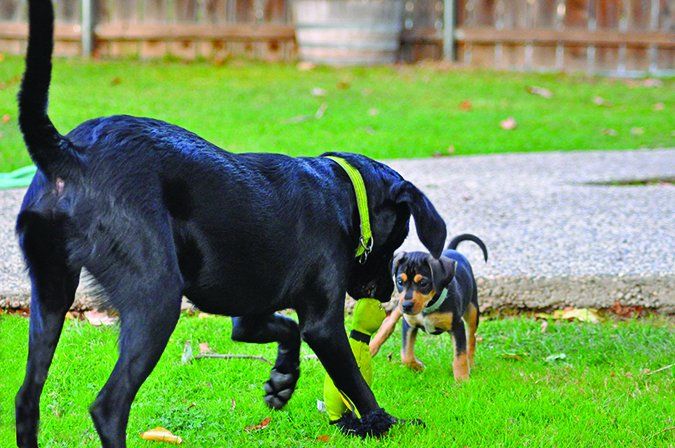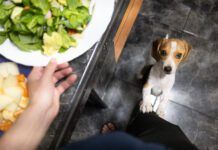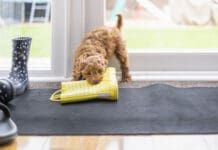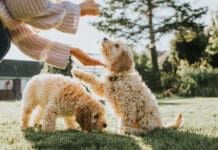One of the neatest things about puppies is that they are little sponges! They soak up the world around them, and when they feel safe, they are curious and engaged with life. We all know that socializing puppies – the process of getting them accustomed to the world around them – is critical to a pup’s comfort and happiness later in life. Socialization can help puppies:
- Learn how to get along with other dogs and not be afraid of people.
- Get accustomed to handling – a skill that can help with grooming, vet visits and more.
- Learn to deal with a little bit of excitement and stress without falling apart.
- Learn that the world is safe, which can reduce fearful and aggressive behaviors.
Socializing is more than just getting your puppy out and about and having him meet lots of people and animals. The way a puppy is socialized is just as important. It is the quality of the exposure that counts (not the quantity!). Your pup doesn’t need to have prolonged or close contact with new things or people. He just needs to have easy, happy experiences. The more relaxed your pup is, the better.
Keep Socialization Fun for Your Puppy!
Help your pup be relaxed and calm. For a younger pup, hold him in your arms if that is calming. Talk to him in soft and gentle tones. Give him treats. Keep him a little bit away from things so he can watch from a comfortable distance until he is ready to explore. Make sure all exposures and introductions happen on puppy time – that is, when your pup wants to engage.
How do you know if your pup wants to explore something new, meet a new person, or play with another pup? Just watch your pup and you will see. If your pup is curious and moving towards the person, animal, or thing, your pup may be ready to engage.
If your pup is cautious, wait. Let him watch from a distance. Pups don’t have to interact with everything and everyone during socialization. Just being in the world, or hearing noises, or seeing people or animals can help them become familiar.
If your pup is overexcited to the point of being frenetic, he may also be lacking confidence or even a little scared. Try to help your pup build confidence by keeping greetings brief, giving your pup treats, or changing how people or other animals are interacting. For example, if your pup is a little too excited greeting people, have people sit down and let your pup go up to them. Or try moving your pup away and let him watch until he shows more confidence.
What if your pup tucks her tail, tries to move away, or perhaps barks or cries? Please, please, please move your puppy away from whatever scares her. This is critical. Making a puppy stay near something or someone that scares her has the potential to backfire and create a real and lasting fear. It is not a good idea to throw a pup into the deep end, metaphorically speaking. Better to move your pup away, let her experience the scary stimulus from a distance, and give her some chicken or other tasty treats. Wait for her to be ready to explore comfortably.
Puppies do go through fear periods – developmental phases when the world is just a little more overwhelming. If your pup seems suddenly scared of more things than he was previously, take a step back from socialization and provide him with comfort, fun things to do, and gentle experiences. Fear periods often pass in one to two weeks.
Canine Adolescence and Beyond
Socialization is a process that starts as soon as a pup is born, and most experts now believe that the first 12 to 16 weeks are the most important. Does that mean that socialization is done when your pup hits 12 weeks? On the contrary, it is very important to continue with positive social experiences, exposure to new things, and exploration of the world through your pup’s adolescence and into adulthood.
If you stop exposing your puppy to new experiences after puppy class, your pup may gradually become less confident in the world and new behavior problems may develop. Ongoing, positive experiences with people, dogs, places, and new things can help your good early socialization stick for life.
What You Should Expose Your Puppy To
One of the things I’ve discovered in my puppy classes is that many people assume socialization is simply about getting your dog around lots of people to be petted and plenty of dogs to play with. This can be a piece of the socialization package, but remember that the goal of socialization is to get your pup accustomed to and comfortable with the world around him.
Puppies need to be exposed in a pleasant way to:
• People, including infants, toddlers, older kids, teens, adults, older people; men and women; people of different ethnicities; big and small people; people with sunglasses, hoods, hats, backpacks, and umbrellas; people in uniforms; people with canes, crutches, or in wheelchairs.
• People doing things such as running, throwing balls, kneeling down to garden, doing yoga or tai chi, standing on chairs or ladders, using tools and pushing brooms, carrying bags and boxes.
• Animals such as dogs, cats, horses, chickens, goats, and any other animal your dog may come into contact with on a regular basis.
• Things that move, such as bicycles, skateboards, running kids, kites, motorcycles, cars, trucks, fire engines, and running animals.
• New places such as your car, the veterinarian’s office, parks, beaches, shopping areas, sidewalks with cars going by, areas where you might walk or hike or vacation, other people’s houses, and pet stores.
• Noises that come with everyday life such as blow dryers, kitchen appliances, vacuums, doorbells, walk-sign beeps, trucks backing up, neighbors in their yards, kids yelling, babies crying, wind and storm noises, and fireworks.
• Different surfaces, such as grass, gravel, pavement, carpet, shiny floors, mulch, sand, wet surfaces outside, and the bathtub.
• Handling (such as touching for vet visits, grooming, patting heads, and even hugging) and invasive interactions, such as people invading their space, taking things from them, and getting into their food.
• Other things your dog might experience in your daily life, such as rain and wind, people with surfboards, boats, tall buildings, or wild animals.
Of course this is only a partial list; there’s no way to expose your pup to all of these things (boy, wouldn’t that be overwhelming and exhausting!). Instead, try to accomplish a few from each category. Learning that new and different things are good can help reduce the chance that your pup will get scared or spooked later in life.
And for a more complete list of puppy socialization ideas, check out “The Puppy Socialization Exposure Checklist“.
Also, keep in mind that your pup does not need to be socially intimate with every person or dog he runs across. Exposure alone is important. Puppies also need to learn to be around people, animals and things that they do not get to interact with, too.
Puppy Socialization and Vaccines
The American Veterinary Society of Animal Behavior and other experts in the field are now very clear that early socialization – before puppies have their full set of vaccines – is very important for the long-term well-being of the pup. Equally important however is keeping your puppy safe from diseases such as parvovirus and distemper. Following these guidelines can help you do both.
1. Work closely with your vet to make sure your pup is on an appropriate vaccine schedule. Wait until seven days after your pup’s first set of vaccines to explore the world.
2. Avoid places where dogs of unknown vaccine history might have been such as dog parks, beaches, and neighborhood parks.
3. Allow your puppy to socialize and play with other puppies who are also following a vaccine schedule. Your pup may also enjoy playing with puppy-friendly adult dogs who are healthy and vaccinated.
4. Take your puppy to your vet right away if she appears to feel unwell.
Ways to Safely Socialize Before Your Puppy is Fully Immunized
Puppies are vaccinated several times, several weeks apart, until they are old enough to ensure that their bodies have had ample opportunity to develop immunity to the diseases for which they have been vaccinated. Until your vet (or better yet, a vaccine titer test) confirms that your puppy is fully immunized, socialize him safely with the following methods:
– Invite friends to your home. Children, adults, men, women, the UPS driver, the gardeners – have your pup see and experience these people in and around your home.
– Take your pup to a friend’s house. Just going into a new environment will offer your puppy lots of new experiences.
– Invite your friends’ healthy, vaccinated, and puppy-friendly dogs over for a play date. Playing with other dogs is important for puppies’ social development and to learn not to bite hard in play.
– Take your pup on a walk in a stroller, wagon, or sling. Just don’t allow him to walk places where there might be feces or urine from other animals.
– Take a large blanket to the park. Let your pup watch the world go by on the safety of the blanket.
– Take your pup for car rides. Help him get used to the motion on short rides to the store or even just around the block.
– Stop by your vet’s office and get your pup weighed. Take along plenty of treats to make it a super-great experience.
– Visit businesses that welcome dogs or a sidewalk café. Carry your pup in – or in the case of a cafe, set him up on a mat – and let him take in the sights and smells.
– Consider taking a puppy class. A well-run puppy class will help you socialize your pup to things outside of your home while your pup is also getting some foundation training. Make sure disinfectants are used to clean waste in your puppy class, and that it’s verified that all puppies in the class have been vaccinated.
What Socialization Can and Cannot Do for Your Dog
Each puppy has his or her own genetic makeup. Genetics influence everything from how tall a puppy will be to how she will react to the world around her. Sociability, startle responses, fearfulness, and excitability may all be part of a genetic package.
Socialization cannot change genetics. But the current belief is that the expression of those genetics may have some flexibility and this is where socialization can help. Socialization can help your puppy be as comfortable, confident, and happy as possible.
In addition, socialization generally is not enough to help a puppy or dog overcome a traumatic event. Careful socialization can help when it is done along with behavior modification, training, and/or medical intervention.
Socialization is showing your dog the world he will live in. It is teaching him that his world will be safe. It is helping your puppy understand that you will always be on his side and that you are a trustworthy partner. Know who your puppy is and what his or her specific needs are. Socializing carefully and with those needs in mind will help your pup become the best he can be. And you can both have fun doing it!







I have an email in draft for Pat Miller. Could you send me the correct contact information. Thank you in advance, ken
Wow this is a great article, thank you for making it and informing us.